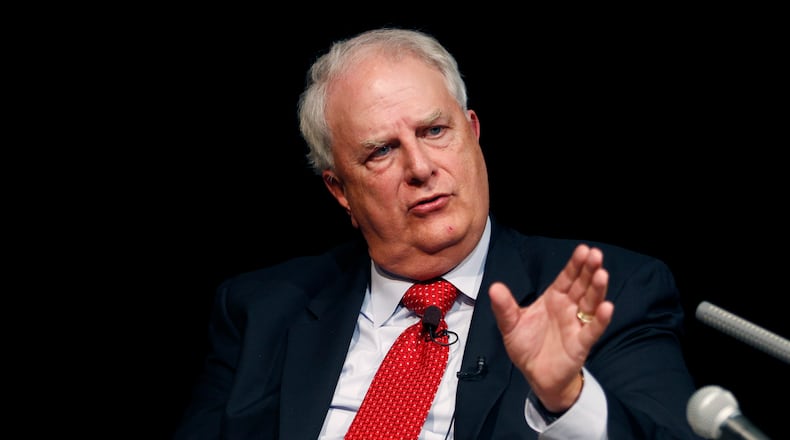On Wednesday, former Gov. Roy Barnes will be the main draw at a midtown Atlanta fundraiser for Vincent Fort, the Democratic state senator who would follow Kasim Reed's path from the state Capitol into City Hall.
But as a sharp critic of Reed’s two terms as mayor.
One might place the Barnes-Fort alliance within the confines of a politics-as-usual box. The two men were legislative colleagues in the mid-1990s. When Barnes was governor, he partnered with Fort to pass a bill to prohibit predatory lending – legislation that has since been largely repealed by Republicans.
Moreover, early January fundraisers are all the rage, regardless of party. State lawmakers are barred from accepting campaign contributions once the Legislature convenes Jan. 9. The months that follow will be a cashless drought for Fort, but not the other seven mayoral possibilities – who have either announced or are still considering the race.
Yet the timing is still unusual. In city races, endorsements from big-name supporters are usually hoarded until voters are paying attention. In his first run, Reed didn’t bring out former mayor Andrew Young until mid-August.
Barnes is a prime source, directly and indirectly, of Democratic campaign contributions. So his early bet could also be read as a notice to fellow check-writers that a) the former governor considers Fort to be a viable contender, and that b) they might want to be a little careful with their money until April or so.
“Barnes gives Fort credibility with the donor crowd,” said Tharon Johnson, a Democratic strategist who has advised Reed, U.S. Rep. John Lewis and many other Democrats.
Then there’s the matter of ideology. He’s trying to cultivate a more serious side, but in the past Fort has had a reputation as one of the state Capitol’s most liberal bomb-throwers. While most ranking Democrats lined up behind Hillary Clinton in the presidential primary, Fort supported Bernie Sanders.
Barnes broke onto the scene decades ago as a conservative Democrat. He drifted leftward over the years, but has always kept his eye on the middle of the Georgia electorate.
Then we have the other name on the invitation for that Colony Square bash on Jan. 4: U.S. Rep. David Scott of Atlanta, one of the most conservative Democrats in Congress — who became a serious critic of President Barack Obama’s approach to terrorism. (Scott is also a brother veteran of the state Senate who served with Fort.)
It is the pan-ideological nature of a Barnes-Fort-Scott alliance that makes one suspect that this isn’t just about the 2017 race for mayor of Atlanta. This may also be a step toward the creation of a coalition that would exist parallel to the state Democratic party — and could become a force in determining who becomes the favored Democrat in the all-important 2018 race for governor.
The contest is the party’s last hope for influence over the redrawing of congressional and legislative districts after the 2020 census.
Democrats in Georgia are a splintered lot. It’s one of the reasons they haven’t been able to take advantage of the demographic shifts that have advertised the state’s purple potential.
Neither Vincent Fort nor Roy Barnes is a fan of Kasim Reed, whose partisan focus has primarily been at the national rather than state level. Reed still has clout. He’ll be one of a handful of Georgians who will help pick the next chairman of the Democratic National Committee when that body gathers in Atlanta in late February. But the current mayor is headed for the private sector, and Reed’s continued influence among Democrats could depend on whether he backs any mayoral candidate as a successor — and whether that choice succeeds.
Yet that’s not the only feud in this family.
Fort has also been a critic of state Democratic party Chairman DuBose Porter’s operation. And you’ll recall that Porter was a primary challenger to Barnes’ attempted 2010 comeback – which the former governor ultimately lost to Republican Nathan Deal.
Meanwhile, Porter’s most steadfast supporter has been House Democratic Leader Stacey Abrams, who has also squared off against Reed – and may attempt a gubernatorial run in 2018. As could Jason Carter, the former state senator who challenged Deal in 2014.
Already this sounds like a bad knock-off of “Game of Thrones.” And we haven’t yet mentioned Michael Thurmond, who at the stroke of 2017 became the CEO of DeKalb County government – and thus the keeper of the largest cache of Democratic votes in the state. And, potentially, a new wielder of clout.
Thurmond considers himself a friend to Porter, whose term as chairman extends into 2019, but says Georgia Democrats are in need of an overhaul. “Our party’s in serious need of restructuring, revision and re-focusing,” Thurmond said.
In conversations on the topic, one wag offered up an observation he said I was free to steal. Democrats, he said, are merely following the historic precedents set by Republicans when they were a struggling minority.
“When the stakes are the lowest, that’s when the fights are the fiercest,” he said.
Stacey Abrams disagreed. She phrased it differently, but characterized the Georgia Democratic party, in essence, as an undervalued growth stock. Whose many investors are positioning themselves for the upward climb.
Internecine battles are to be expected, Abrams said. “We remember the victories. We forget all the shouting that happens in between.”
About the Author



